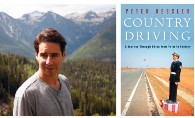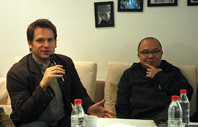
Interviewer: Kun Kun
Photographer: Wang Kedi
Transcription: Lin Kanxuan
Interviewer:
What’s the first time you get these kind of sources? It’s vividly, very like a story or literature.
JS: I studied Kangxi period when I first looked at the Cao’s family. Cao Xueqin’s grandfather or granduncle, worked for Kangxi emperor. That’s the connection between Cao Xueqin family and Kangxi’s court, which is a written down by a novel. The grandfather was a real figure, not just for A Dream in Red Mansions, a real minister for Kangxi emperor.
I went to Taipei in 1961, It was quite impossible to visit China for foreigner, but it’s possible to go to Taipei. Because of the war between Communists and Nationalists, Many Chinese archives went to Taiwan. I have a friend living in Australia, working in Australia National University in Canberra. I work with him in Australia, and he had a friend, who’s in charge of the archives in Taichung, Taiwan. He gave me permission to study the original writing of Kangxi and Cao Yin. Many scripts were in Taichung. I was able to go and read those stories. I think I like Kangxi because he had to learn Chinese language as a child. His first language was Manchu.
Kangxi was able to write very clearly and not so fast, quite slowly, not like cursive script. It’s very helpful for a scholar. And then Cao Yin wrote very clearly; he was just a minister. He wrote very carefully, very precisely. But in these manuscripts, I realize that the sources are very basic. Some of them were used for the Chinese history like Da Qing Shi lu, the historical writing. They also use Kangxi.
Even something like stayed document for Kangxi reign, there are millions of stories everywhere about Chinese, about the problems, showing us how many things had happened before. For example, First time Qing tried to defend against too much foreign trade, and isolated foreign traders. Although he’s a Manchu, he was a Chinese nationalist as well. In his mind, there was no conflict between Chinese people and Manchu people. Different language marriage customs, or different dress. Manchu women never bound their feet. It was forbidden, but Chinese women did.
In many ways, it was bicultural. I found it is like an earlier version of a kind of complexity of Chinese Nationalism and complexity of Chinese…well, we will not call it the place in the world.
How to place China in the world? Was it dominating? Was it experimenting? I felt it experimenting and exploring, looking for its natural size and shape. Kangxi and his grandson Qianlong expand their territory, making it bigger including Xinjiang, Qinghai Provinces. Also, Kangxi sent army to Taiwan, which was incorporated with China. I believe before Kangxi period,Taiwan was very separate from China, just some trading, but very little.
In Kangxi’s conquest, he integrated Taiwan into Chinese history. And I guess Taiwan was made a county, and later prefecture. But it was not made a province until near the end of Qing Dynasty, during late Guangxu. It was taken by Japanese. Just when Taiwan was integrated in China, it became Japanese colony. That introduced many new angles. After working with Kangxi and early Qing, I got very interested in Mingguo history, the republic history.
How near did China come to succeeding with a new kind of government? The imperial of government collapsed in late Qing Dynasty and the Japanese made them collapsed. Swifter.
What would be the alternatives? Was it alternative parliament? Could you have election? The answer was yes. In 1912, China held a significant election for the local assemblymen, as they develop their own assemblymen. You began to find like provincial history. I understood more like Hunan history, Guangxi history. I got interested in the fragmentation, unification; unification of fragmentation.
What is the force holding these together? How strong was it? Why did China not have a successful Nationalist government? Even an efficient government in Mingguo period? Why so little? Because their ceremony of regional loyalty I think. It was hard for civilians, politicians to conquer the military; rule the military of officers. In English, we usually called “Warlordism.” That made fragmentation, and then the British, French, Japanese, German, Russian. It’s so hard for China to make its own future; all these countries coming in. So, slowly, I got interested in all the different ways and that’s why I called this period of history Chinese early revolution.
In that period, I read some poetry by Beidao. They are very beautiful, written in 1978 or 1979, at the time when democracy movement took place. And then I realized later that’s coincided with Deng Xiaoping’s power. Deng Xiaoping coming after Mao has died. Deng Xiaoping has a different kind of legacy. Every Chinese family has some kind of experience from that period. For me, it’s a wonderful source of the history. Looking how different the world can be. So many ways of looking at the world.
Interviewer: For the Chinese government right now, if they want to lead the country in the right way, you cannot depend upon Mao’s opinion.
JS: Yes, obviously. Much has happened since. Mao was a powerful man in China, but that’s over. That’s a memory. It’s still kept alive by the Party. But for many people, it’s clearly many kinds of transition are possible. And the difficulty is doing this by quiet transformation, not angry confrontation, because I didn’t see anybody gaining from such a confrontation in China. It’s hard to say who would win. It doesn’t make any sense. Different people have to come together, trying to assess so many things. Chinese history’s so huge, but obviously it has to do with representation. How do you decide? This is not anything secret. It should be provisional level, or township level, or family level. Who decides that? It should be people in the given area, who interpret the constitution in their own way.
In the Xinhai Revolution, each province was developing a constitution. Again, in my early works, I found it interesting. They had assembly meetings that were arranged by the province. The trouble was that each province also had military leaders. After Xinhai Revolution, the military leaders became swiftly more powerful than the civilians, politician. Even the province stayed moderate and peaceful, they had to have a compromise between military and civilian government and KMT Party organization. As far as I can understand, party organization was carried over into the Communist society, but that left very many problems.
You can say 1949 is a new beginning. They assume many other options. We need to think more and more worldly. Western scholars are reading from Chinese texts. They kind of assume now that China will have new leaders in 1 or 2 years as the next six generations I would like to call. This is a time with new opportunities for China. It’s also a time when Chinese economy is very strong.
In the Xinhai Revolution, the Chinese was not very economically strong and under KMT was not very strong. But it’s now global part financially. Presumably with the resources of Chinese people and the mutual collaboration within China, you can keep foreigners at a distance and focus on China’s own economical problems, or regional problems. And now China has become global part, world part. You have to decide how to put resources available to China’s wider travel, for Chinese more studies about the institutions, as well as more trades with Australia, Pakistan. They are very different society, but they all have interest in working with China. So how can China make the most out of this opportunity? This question interests me. For me, the history comes back to the individual. History is composed of interlocking work of countless individuals.
American cultural is a Melting pot. People come to the United States from different countries, and then everybody eventually become the same. In China, it doesn’t seem to be true. People keep their own individuality. Regionalism may be more complicated in China than in the US.
It’s getting difficult now in the US because of the problem of migration, immigration, which American government doesn’t seem to know how to handle. It’s difficult to decide what is legal immigration and what is illegal? How do you define that? One problem for the president is deal with is the historical background is complicated. But he has the president’s view of all of these different migrations, about how to handle that. In China, you can say it’s an unfinished business. The government and people haven’t worked hard. How to tell this particular story. There are so many ways. I never really got much outside late Ming history.
I know earlier Chinese how it is reflected by late Ming, so that’s why Zhang Dai was the last thing I wrote. Zhang Dai was both the scholarly founder, and also the victim of Manchu conquer. At the same time, as he watched China’s problem in late Ming early Qing. He was very well in educating his children, to forbid them to take to Manchu town.
After about 20 years of Manchu conquer… I think Zhang Dai was very probably Chinese nationalist. He felt that his sons should take the exam, and go to Hangzhou to see if they can get the Ju Ren degree. I think probably neither did. His two sons couldn’t pass it. Zhang Dai decided to do their own studies; he had his own way. He lived much longer than he expected, and he also wrote Tao An Meng Yi. It’s a very beautiful, complicated book, to record his dreams in the national context and to keep track of all these dreams and to write them down.
Interviewer: Do you have any standards for you to choose some specific people to describe?
JS: I don’t arrange the bound, and I don’t have a schedule. To me, history is a series of person’s story. It seems to be the way I work as I’m trying to understand one period of history or get to know someone like Zhang Dai. I’m just around the corner, someone like Liang Qi Chao or Hing Xiuquan. That leads me to HK, maybe Taiwan, my native country England, Japan. I felt I am lucky to find the right stories and we had a full discussion about the narratives yesterday afternoon. I tried to let the sources shape the narrative. I didn’t try to make the sources into the narratives. What did they try to tell us? What did the dead have to say? How do they analyze the chances, and how can we later understand how they tried to comprehend the difficulties of their own time.
I have great respect to the difficulties of the Chinese to live through. The difficulty making clear decisions must be huge. The country has different kinds of localism. Maybe there’re not so many huge conflicts. Most countries had bad civil war, like America. Terrible, huge casualties. And English in 17 century, violent war took place, killing the king. Always unthinkable in those days. There are also about linkages from British history and individual stories like linking British history to French history.
But we found that Chinese going to France. In early 17 century, there are dons of work about the first Chinese in Europe because they are the ones to explore. Hu Rouwang came to France at that time and he was unable to adjust from China to French. He couldn’t do it, so he became unstable.
He was the central figure. In the state of Hu, the state put him in mental institution because he could not live comfortably in French society. He couldn’t afford to go back to China. It was expensive, and it spent him maybe two years from Paris to Beijing, or Guangzhou. We have similar things there by somebody who’s been forced to be silent. What do you do when the sources become silent? If your story was treated as mad, how do you prove it accuracy? I haven’t not very widely read modern Chinese literature. One story by Beida, it’s about the wrong side of the world. How do you look over the world? I think Beida has a story about the blue kite. It’s about a child trying to get the kite out of the tree. It’s from a collection of short stories, about ten pages long, written in 1990. In the West, there are many Chinese memoirs published about Cultural Revolution. Some aspects show people forced into silence, but they were able to speak again. Politics can also be liberated.
Interviewer: History comes back to the individuals. They always face the similar situations.
JS: Well, that’s in a very broad way. That’s why the individual story shows how different someone can be. If you go deeper, you’ll find very profound differences and backgrounds and expectation and family.Each of these makes the story more complex. But I like the fact that human life gives a thread, a direction. People say that I write biographies. I said no. Biographies broad the scale, but I’m more interested in every single detail, which tells the shock of the stories. How many details can you fit into the story? But other scholars sometimes lose the track of the story. They get too much information, so history writing has to be selected. You should have selectivity, or you can’t keep the story intense.










Comments